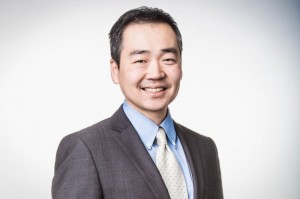**This blog post was written by Kimmel Cancer Center development coordinator Allison Rich.
Ben Park, M.D., Ph.D., was recently named the Johns Hopkins Kimmel Cancer Center’s associate director for research training and education. Already an internationally recognized physician-scientist committed to training and mentoring young students and faculty members, Park’s new role allows him to even more actively shape a future that, once again, places education at the forefront of academic medical science. By designing and implementing solutions that will increase the appeal of the lengthy and arduous doctoral training tracks, Park plans to help ensure that today’s most brilliant minds continue to develop the treatments we need in the clinics of tomorrow.
As part of his charge to develop an overarching vision for how postdoctoral education should be approached at the Kimmel Cancer Center, Park has invested in finding a solution capable of securing the future of cancer research — a solution that he views with a sense of urgency.
“We need to halt the current level of attrition in academic research training programs. That’s the only way we are going to cure cancer,” says Park. “Our work is predicated on this notion of translating the best science from the bench to the bedside. The truth is that there will be very little bench left if we don’t rethink how we train our clinician-scientists and incentivize more young minds to go into this field.”
His two-pronged approach reshapes education by enhancing the formality of the postdoctoral training process and broadening the scope of opportunities available to postdoctoral students after they have completed their training. It has vast potential to transform how we approach advanced education across the medical field and simultaneously strengthens the educational component of the Johns Hopkins tripartite mission to advance patient care, teaching and research. His global vision underscores the idea that education is the most empowering component of our efforts, both for our faculty members and those who will pursue related careers in other facets of oncology.
By encouraging postdoctoral students to participate in industry internships, for instance, we can craft a mutually beneficial situation for postdoctoral students to expand their expertise and the cancer medical industry to develop relationships with potential employees who are well-versed in cancer medicine and ready to apply that knowledge to numerous facets of the field. Preparing students for research-related careers provides the unparalleled opportunity to allow the best and brightest trainees to influence how cancer is viewed socially, in public policy, in industry, and through regulation — not solely from the laboratory or the clinic.
In the field of cancer medicine, education is a lifelong commitment — and it is not a commitment that applies only to those who go on to pursue a career at the laboratory bench. Instead, Park underscores the importance of broader public awareness of what cancer is and what it is going to take to cure it. Ensuring that individuals across all facets of cancer medicine — scientists in the lab, entities who shape public policy or the pharmaceutical regulators at the Food and Drug Administration — have a thorough understanding of how to best approach cancer research, treatment and prevention, we can cement a surer path toward a cure together.
More information on cancer research training at the Johns Hopkins Kimmel Cancer Center
